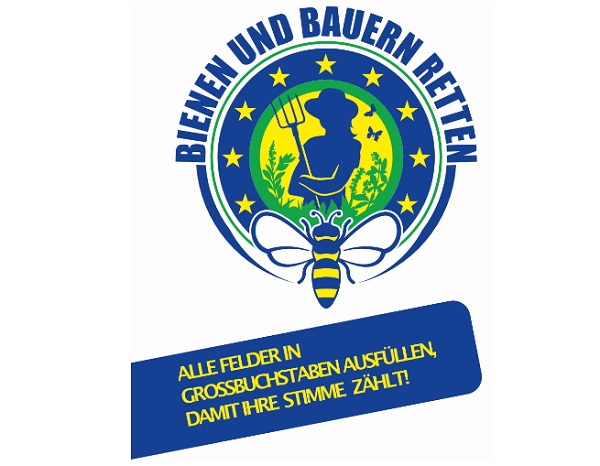
The natur&ëmwelt a.s.b.l. has announced that, together with many civil society organisations, popular movements, beekeepers' organisations, local citizens' initiatives, groups of farmers and scientists, natur & ëmwelt supports the European citizens' initiative "Save the bees and the farmers"; its goal is to create an agricultural landscape that allows bees and farmers to thrive in a healthy environment for the benefit of all.
Its aim is, together, to collect at least one million signatures (471,780 on 29 March 2021 at 11:00) for the European citizens' initiative "Save the bees and the farmers!" so that the European Commission and the European Parliament are legally obliged to respond to the demands of the said citizens' initiative. In addition, at least 7 countries must exceed their respective national thresholds for the citizens' initiative to be considered successful and officially recognized by the European Commission. Luxembourg currently has 2,008 signatures (as of 29 March) and needs a total of "only" 4,500 valid signatures. As a result, the Grand Duchy is a beacon of hope for the movement and every voice counts.
To sign the European citizens' initiative, see https://www.naturemwelt.lu/signée-initiative-citoyenne-europeenne-sauvons-les-abeilles-et-les-agriculteurs/.
Why save and help bees and farmers in Europe?
According to natur&ëmwelt, the current agricultural model, geared towards ever higher yields based on chemistry, has led our ecosystems to collapse. The biodiversity on which our food systems are based is declining day by day. The future of our food security, our environment and our health is seriously threatened.
The consequences for nature are catastrophic: hedges, flowering meadows as well as bees, butterflies and other insects have disappeared from our landscapes. The birds have stopped singing in our fields. At the same time, our waterways are polluted and nature and citizens are continually exposed to a cocktail of synthetic pesticides. In addition, the very existence of farmers is threatened by this model of industrial agriculture: every 3 minutes a farm in the EU ceases to operate. Following the motto "Grandis ou peris", a decreasing number of farms own more farmland and must generate ever higher yields to survive. Small farms can often no longer feed a family. With their disappearance, rural areas of Europe are losing jobs and their historic cultural heritage.
However, there is a solution: an agricultural system without synthetic agrochemicals is possible. It is an agriculture which preserves and develops the diversity of landscapes, food and agricultural traditions in Europe. An agricultural model that ensures a harmonious coexistence of bees and farmers, healthier agriculture for citizens. With this European Citizens' Initiative (ECI), we want to make this agricultural model the model practiced in Europe. In addition, 250,000 farms already cultivate the land in accordance with ecological standards without using synthetic pesticides in Europe.
The three main demands of the ECI are as follows:
1) Eliminate synthetic pesticides: Gradually reduce the use of synthetic pesticides in EU agriculture by 80% by 2030, starting with the most dangerous of them, then eliminating them completely from here 2035
2) Restore biodiversity: Restore natural ecosystems in agricultural areas and ensure that agriculture can again contribute to the promotion of biodiversity. In Luxembourg too, the disappearance of species continues despite numerous measures taken by politicians. The future catalog of measures must therefore not only sound good and politically sympathetic, but must above all be based on scientifically founded experiences and facts, so that biodiversity is finally helped effectively.
3) Support farmers in the transition: Reform agriculture by giving priority to small-scale, diversified and sustainable agricultural production, by supporting a rapid increase in the use of agro-ecological and organic practices and by promoting training farmers through knowledge exchange as well as independent research for a pesticide-free and GMO-free agriculture.








